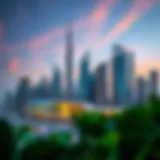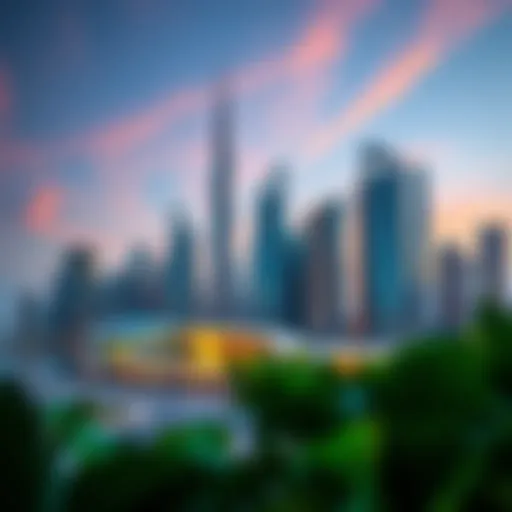Exploring Dubai's Mosques: Architectural Wonders and Culture


Intro
In the bustling city of Dubai, where modernity and tradition intermingle, mosques stand as a testament to the architectural prowess and cultural depth of Islamic heritage. These sacred spaces serve not just as sites of worship, but as cultural hubs that resonate with the vibrant community life in the emirate. Visitors will find themselves drawn into an intricate web of history, stunning architecture, and social relevance that each mosque encapsulates.
Understanding these holy places provides a compelling glimpse into the cultural and spiritual fabric of Dubai, enhancing one’s appreciation for the city as a whole. While many associate Dubai with its towering skyscrapers and luxury shopping, the mosques present a different narrative—one grounded in faith, community, and artistry that many expatriates and tourists might miss if they stick to common attractions.
Whether you are a real estate investor considering the cultural significance of neighborhoods, or an expatriate looking for places to connect with local traditions, the exploration of Dubai's mosques provides valuable insights. Each mosque tells its own unique story, contributing not just to the skyline but also to the essence of what it means to live and thrive in this dynamic city.
Foreword to Mosques in Dubai
The mosques in Dubai are not merely places of worship; they serve as visual symbols of the rich Islamic heritage and cultural fabric woven throughout the city. They stand as monuments of architecture, echoing the principles of faith while expressing the journey of Dubai from a fishing village to a bustling metropolis. Highlighting the significance of mosques requires a recognition of their multifaceted roles within Islamic culture and beyond.
Importance of Mosques in Islamic Culture
Mosques hold a central position in Islamic culture, acting as spiritual epicenters where the community gathers for prayer, reflection, and worship. They are more than just buildings; they embody the essence of Islamic teachings and the reverence for faith that permeates various aspects of life. This significance is emphasized through several key points:
- Place of Unity: Mosques foster a sense of community among believers. They are places where men and women from diverse backgrounds converge, sharing moments of collective worship and support.
- Center for Education: Historically, mosques have served as educational institutions, teaching religious tenets, moral values, and cultural practices. They offer classes and seminars that aim to enlighten both the young and old, bridging generational gaps in understanding.
- Cultural Events: Many mosques host cultural gatherings, lectures, and discussions, enhancing the understanding of Islam and its practices. These events often extend beyond religious teachings, embracing discussions on art, literature, and philosophy, thus enriching cultural exchanges among those who partake.
Understanding the role mosques play within Islamic culture enhances one's appreciation of their architectural beauty and the dedication poured into their designs. These structures symbolize more than faith; they reflect the very identity of the community.
Overview of Dubai's Religious Landscape
Dubai's landscape is a melting pot of cultures and religions, with mosques standing as essential landmarks among a diverse tapestry of beliefs. The presence of numerous mosques throughout the city illustrates not only the predominance of Islam but also the harmonious coexistence of various religious practices. A few points characterize this unique religious milieu:
- Religious Tolerance: Though Islam is the main religion, Dubai embraces religious diversity. You can find churches, temples, and other places of worship, showcasing the city’s commitment to inclusivity and peace.
- Diverse Worship Opportunities: The mosques cater to a vast demographic, offering prayers in multiple languages and accommodating residents and expatriates alike. This accessibility makes them pivotal in daily life.
- Cultural Fusion: Many mosques feature architectural styles blending traditional Islamic motifs with modern aesthetics, reflecting the city’s evolution alongside its heritage.
Overall, the religious landscape in Dubai illustrates a narrative of tolerance and respect. By observing mosques and understanding their role, one can gain a deeper comprehension of Dubai’s cultural and spiritual heartbeat.
Architectural Styles of Dubai's Mosques
Understanding the architectural styles of mosques in Dubai is like peeling an onion; every layer reveals something new and significant. This aspect of the article serves not only to showcase stunning designs but also to convey the cultural and spiritual ethos embodied in these structures. The fusion of traditional and modern elements contributes to a unique aesthetic that reflects the dynamic nature of Dubai itself.
Traditional Islamic Architecture
Traditional Islamic architecture in Dubai displays a rich tapestry of cultural influences. Often characterized by intricate tile work, large domes, and soaring minarets, these architectural details do more than visually impress; they hold deep religious significance. The use of geometric patterns and arabesques not only uplifts the spiritual experience but also adheres to the teachings of Islam that discourage representing living beings. The placement of a mosque’s entrance is also significant; it leads believers toward the qibla, the direction of the Kaaba in Mecca.
Some notable features include:
- Courtyards: Many traditional mosques feature spacious courtyards, allowing space for prayer and congregation. The Taqwa or the inner qualities of the worshipers can be reflected in how they engage with these communal areas.
- Decorative Elements: Calligraphy is often found on the walls, featuring verses from the Quran. This art form adds a layer of both spiritual and aesthetic value, creating an immersive atmosphere for worship.
An example of this style is the Al-Fahidi Mosque, which beautifully integrates these traditional elements, reminding seekers of their connection to the divine.
Modern Interpretations
Contrasting the traditional architectures, modern interpretations of mosque design in Dubai often embrace a minimalist aesthetic while incorporating cutting-edge technology and materials. These mosques symbolize a bridge between the past and the future, encapsulating the rapid development of Dubai as a global metropolis. The integration of glass, steel, and sustainable materials showcases a commitment to modernity while maintaining the essence of Islamic architectural principles.
Features to note in modern mosques include:
- Geometric Shapes: Clean lines and geometric forms are hallmarks of contemporary mosque architecture. The Sheikh Zayed Mosque, while based on traditional designs, incorporates modern techniques and materials, presenting a harmonious blend of the old and the new.
- Sustainability: As global awareness of environmental issues rises, many mosques are designed with sustainability in mind. Using solar panels and natural lighting not only helps lower operational costs but also aligns with Islamic teachings about stewardship of the Earth.
- Art Installations: Modern mosques often include art installations that reflect local culture or themes relevant to the community, offering visitors a multi-layered experience beyond the physical structure.
Dubai’s mosques are a visual dialogue between cultures, eras, and philosophies. Understanding these architectural styles not only enriches one’s appreciation for these beautiful spaces but also provides insights into the evolving identity of Dubai itself. As potential investors or admirers of architecture, recognizing these layers may influence decision-making in the region's real estate market.


"The beauty of architecture lies in its ability to tell a story, infusing the mundane with the timeless."
By delving into the architectural styles of Dubai's mosques, we gain a broader perspective on how these buildings elevate everyday life, serving both as places of worship and as cultural landmarks.
Noteworthy Mosques in Dubai
Dubai is adorned with a fascinating array of mosques, reflecting not just the aesthetic richness of Islamic architecture but also the city’s vibrant cultural fabric. Each mosque has its unique story, intertwining with community life and engagement. In exploring these notable mosques, one can appreciate the profound impact they have on the spiritual and social landscape of Dubai. This section will highlight three prominent mosques: The Grand Mosque, Jumeirah Mosque, and Sheikh Zayed Mosque, emphasizing their architectural significance and role within the community.
The Grand Mosque
Design Features
The Grand Mosque captures the attention of visitors through its breathtaking architectural features. One standout is its use of traditional Islamic motifs interwoven with modern building techniques. The intricate calligraphy and geometric patterns speak to a sense of artistry that is both timeless and innovative. A notable characteristic is the towering minaret that rises majestically, serving as both a visual focal point and a functional element announcing the call to prayer.
With every archway and dome, the design doesn’t just aim to impress; it also fosters a tactile engagement with the space, allowing worshippers and visitors alike to connect on a deeper level. Its grand scale is not just for show; it accommodates a large congregation, reinforcing its role as a central hub for the community.
Historical Significance
Steeped in history, the Grand Mosque has witnessed numerous events since its establishment. This place of worship is not only significant for its architectural beauty but also for its role in the socio-cultural evolution of Dubai. Over the years, it has become a site for major religious gatherings, symbolizing the unity of the Muslim community in the emirate. It holds historical value as it reflects the values and traditions passed down through generations.
Additionally, the mosque has been a witness to the rapid urban development of Dubai, marking the juxtaposition of modernity with tradition. Visitors often find themselves immersed in a narrative that stretches beyond its walls; the mosque connects the past with the present.
Community Role
The Grand Mosque is more than a sacred place; it is the heart of community engagement. It serves various functions beyond mere worship—charity events, educational workshops, and interfaith dialogues are hosted here, inviting people from different backgrounds to come together. This multifaceted community role promotes harmony and understanding within the diverse populace of Dubai.
Unique programs dedicated to youth and families encourage a deeper understanding of Islamic values while fostering a sense of belonging. The mosque’s role thus transcends religious boundaries, making it a pillar in Dubai’s social framework.
Jumeirah Mosque
Architectural Highlights
Jumeirah Mosque stands out due to its striking blend of traditional and contemporary design styles. Its white stone façade is beautifully illuminated at night, showcasing intricate details that can often be overlooked in the daytime. The mosque features two majestic minarets that frame the main dome, creating a balanced and harmonious presentation. This design aspect resonates with both aesthetic appeal and practical function, allowing natural light and ventilation to fill the interior spaces.
The realism in architectural representation makes it a favorite for photographers and visitors who appreciate fine details in building designs.
Visitor Accessibility
Accessibility is a crucial aspect of Jumeirah Mosque. Unlike many mosques that welcome only Muslims, this one opens its doors to all visitors, allowing them to experience its beauty and significance firsthand. Guided tours are available, often led by knowledgeable staff who share insights on Islamic practices and the mosque’s history.
This openness fosters an environment for education and cultural exchange, making it one of the key destinations for those looking to better understand Islamic teachings and rituals.
Cultural Tours
Jumeirah Mosque offers cultural tours that are meticulously designed to enhance understanding. These tours not only include a walkthrough of the architectural marvel but also elaborate on the cultural aspects of Islam. Participants are often treated to discussions on local customs, community values, and the mosque's role in promoting peace and understanding among diverse societies.
Offering this educational insight makes the mosque an essential stop for expatriates and tourists interested in experiencing the cultural intricacies of Dubai.
Sheikh Zayed Mosque
Comparative Analysis with Other Mosques


Sheikh Zayed Mosque is often compared with other significant mosques due to its unique architectural grandeur and public accessibility. It employs a variety of architectural influences that span borders and traditions, which is a distinct characteristic that sets it apart. The mosque blends Islamic styles from various cultures, creating a melting pot of aesthetic and cultural expression that is seen in its arches, domes, and landscaping.
Notably, it’s larger than many traditional mosques, making it a significant landmark in the UAE, drawing both pilgrims and tourists alike.
Symbolic Elements
Strong symbolic elements are woven throughout the architectural design of Sheikh Zayed Mosque. For example, the use of white marble symbolizes purity and peace. The intricate floral designs throughout the mosque represent the natural beauty of the UAE, grounding its presence in the local environment. These elements not only serve aesthetic purposes but also provide spiritual depth, encouraging reflection and contemplation among visitors.
The mosque's ability to encapsulate such symbolism makes it a subject of interest for those wishing to explore the deeper meanings embedded within Islamic architecture.
Tourist Engagement
Tourist engagement at Sheikh Zayed Mosque is thoughtfully curated to ensure respect for its sacredness while providing an enriching experience. The mosque frequently hosts events catered to non-Muslims, fostering a spirit of inclusivity. Workshops, art exhibitions, and cultural events encourage tourists to engage with their surroundings proactively.
This commitment to involving visitors in meaningful ways enhances their understanding of not just the mosque, but also the broader context of Islamic culture in Dubai. The mosque’s extensive programs are advantageous as they promote cultural appreciation and stimulate dialogue among different faiths.
By considering these noteworthy mosques, one gleans more than just architectural splendor; they reveal the heart and soul of a community in Dubai that is deeply rooted in tradition, yet continually evolving.
Cultural and Community Engagement
The role of mosques in Dubai transcends their primary function as places of worship. They stand as significant pillars within the local community, engaging citizens and expatriates alike in a spectrum of interactions. Understanding this aspect of mosques sheds light on their cultural importance, offering reflections of both respect and inclusive practices. While many may picture these sacred spaces as mere architectural wonders, they are also vibrant hubs of social activity and intercultural dialogue.
Role of Mosques in Promoting Tolerance
At the heart of Dubai's mosques lies a commitment to fostering interfaith understanding. These structures do not simply serve Muslims; they aim to bridge cultural divides and promote tolerance among diverse populations. The Jumeirah Mosque, for instance, is frequently lauded for its open-door policy. Visitors are welcomed regardless of their faith, encouraging conversations that break down barriers.
Mosques like this provide educational tours that explain Islamic traditions and practices, simultaneously dispelling myths and misconceptions. Such efforts are instrumental in fostering acceptance and creating a community where differing beliefs are respected. In a global city like Dubai, where varied cultures converge, this ability to cultivate dialogue is essential. It enables individuals from all walks of life to coexist peacefully, contributing significantly to the social fabric of the city.
"Tolerance is a cornerstone of our society, and the mosques embody this principle as vital centers for gathering, learning, and understanding."
Community Events and Activities
Mosques in Dubai play a crucial role in hosting community events and activities that further enhance their function as community hubs. They organize various gatherings, from religious lectures to family-oriented activities, fostering a sense of belonging among residents. Events such as Ramadan iftars and Eid celebrations often draw in large crowds, showcasing the vibrant spirit of community life.
In addition to religious observances, these sacred spaces can host workshops, fitness classes, and even art exhibitions. For example, the Grand Mosque sometimes invites artists to showcase local talent, blending culture and spirituality in a unique manner. These initiatives generate a sense of unity, and engage people of different backgrounds, encouraging participation beyond the confines of traditional worship.
Moreover, mosques often extend their outreach into the community through charitable initiatives. They contribute to social well-being by offering food banks or facilitating support for the less fortunate, embodying the spirit of giving inherent in Islamic teachings. This aspect of community involvement reflects a broader commitment to societal welfare, bringing residents together for common goals and embodying a rich cultural ethos.
As Dubai continues to grow, so too will the significance of its mosques in shaping the future of the community. Engaging citizens through inclusive practices and cultural events fortifies the essential role these structures play—far beyond that of just places of worship. In essence, mosques enrich the social landscape, merging spirituality with the everyday lives of those who call Dubai home.
Visitor Guidelines and Etiquette
Understanding visitor guidelines and etiquette is paramount when exploring the rich tapestry of mosques in Dubai. These sacred spaces are not just architectural wonders but also serve as centers of community and spirituality. Visitors must navigate these spaces with respect and awareness, ensuring that they honor local customs while enjoying the beauty and history that each mosque encapsulates.
The guidelines focus on specific elements that contribute to a positive experience for both visitors and worshippers. They encompass dress code requirements and photography policies, both vital in maintaining the sanctity of these religious sites. Respecting these guidelines not only enhances the visitor experience but also helps foster mutual understanding and appreciation between diverse cultures.
Dress Code Requirements
When stepping into a mosque in Dubai, the first thing to keep in mind is the dress code. The expectations here are rooted in Islamic traditions and reflect the spiritual significance of the space. In general, both men and women are required to dress modestly.
For women, this often means wearing long, flowing dresses or skirts that cover the arms and legs completely, complemented by a headscarf to cover the hair. Men are typically expected to wear long pants and shirts with sleeves, avoiding shorts and sleeveless tops. This dress code is not merely for show; it is a sign of respect for the beliefs and practices embedded within these walls.


While it may seem restrictive, adhering to the dress code offers several benefits:
- It allows for deeper immersion into the cultural experience.
- It fosters goodwill between visitors and local communities.
- It demonstrates an understanding of the local customs, ultimately leading to a more enriching visit.
Photography Policies
Now, let’s talk about photography. Many mosques in Dubai have specific policies regarding photography that visitors should be mindful of. While capturing moments can be tempting, it’s essential to understand where and when it’s permissible to take pictures. Most places allow photography in designated areas, but some may restrict it inside prayer halls or sensitive areas.
For example, the Jumeirah Mosque is generally open for photography, yet during prayer times, visitors are asked to refrain from taking pictures. Always look for signs indicating photography policies, or better yet, ask a member of the mosque staff if uncertain. This respect for the rules reflects well on the visitor, showcasing a sensitivity towards the traditions and beliefs that inspire such guidelines.
"Respecting local customs not only makes your visit more enjoyable, it creates lasting connections between cultures."
To stay informed, visitors might check mosque websites or tourist information centers for up-to-date details on photography policies before embarking on their journey. Understanding these unspoken rules enriches the overall experience and fosters an environment of respect and comprehension across different cultures.
Thus, following these visitor guidelines and etiquette not only enhances an individual’s understanding of Islamic culture but also promotes harmony and respect among diverse populations in Dubai. While exploring the architectural marvels of Dubai's mosques, a little attention to cultural nuances goes a long way.
Mosques and Real Estate Influence
Dubai's mosques play a significant role not only as places of worship but also as central elements in the real estate landscape. The presence of a mosque in a community often serves as a beacon for both cultural cohesion and property value appreciation. Hence, it's crucial to examine how these sacred sites influence local property markets and the decisions of homebuyers.
The impact of mosques on real estate is multifaceted. For many, the proximity to a mosque enhances the desirability of a neighborhood, boosting its appeal among potential homebuyers. In Dubai, where a diverse population coexists, having a mosque nearby is seen as a valuable resource, serving as a hub for spiritual and community activities. This creates a cultural environment that often leads to higher demand in the housing market.
Impact on Local Property Values
When analyzing property values around significant mosques in Dubai, there is clear evidence that these structures affect market trends. Areas with renowned mosques frequently enjoy higher real estate prices compared to neighborhoods lacking such amenities. The reasons behind this phenomenon include:
- Cultural Significance: Mosques reinforce community ties and foster a sense of belonging, making neighborhoods more attractive.
- Accessibility: The convenience of having a place of worship nearby often draws families and individuals looking for a vibrant yet peaceful living environment.
- Infrastructure Development: Areas near mosques tend to see enhanced public amenities, such as parks and community centers, which further elevates property values.
Overall, the presence of a mosque often indicates a stable, well-maintained community, enticing buyers who seek long-term investments.
Spiritual Factors in Home Buying
In addition to economic considerations, spiritual factors also influence the home-buying process. For many Muslims, living in proximity to a mosque fulfills a fundamental expectation of their faith—regular participation in communal prayers and activities. This intrinsic connection influences various aspects of property selection:
- Daily Commute for Prayers: Many families prioritize homes within a short distance to their mosque to facilitate daily prayers.
- Community Engagement: Buyers often seek areas with vibrant mosque communities, desiring to participate in events, educational programs, and social gatherings.
- Cultural Alignment: Homebuyers often consider the cultural fabric of their neighborhoods, ensuring that they align with their traditions and beliefs.
In summary, the intertwining of mosques and real estate in Dubai reflects a sophisticated relationship where spirituality meets real estate dynamics. These sacred spaces significantly contribute to community identity and property desirability, and understanding this dynamic allows potential buyers and investors to make informed decisions about their investments in the city.
End
In understanding the spiritual and architectural significance of mosques in Dubai, we shed light on their multifaceted importance in the cultural lattice of the city. This article's exploration provides not only a glimpse into the grandeur of these sacred spaces but also emphasizes their role in shaping community identities and interactions. Through mosques, residents and visitors alike encounter a blend of tradition and modernity, which reflects broader societal values.
Summary of Key Insights
The mosques of Dubai offer a wealth of insights that extend beyond mere physical structures. Here are a few key takeaways from our exploration:
- Architectural Diversity: Each mosque embodies a unique architectural style, showcasing both traditional Islamic design and contemporary adaptations that resonate with Dubai's evolving skyline.
- Cultural Hubs: Mosques serve as vital community centers wherein different cultural and social activities are hosted. They foster fellowship, unity, and provide vital resources to the community.
- Visitor Engagement: Mosques have become increasingly inviting to tourists, promoting cultural awareness and dialogue through guided tours and educational programs. This helps break down barriers and enhances mutual understanding between cultures.
- Real Estate Implications: The proximity of mosques to residential areas typically influences property desirability and value. Investors might consider these factors when making decisions in an ever-competitive market.
The Enduring Significance of Mosques
The relevance of mosques in Dubai extends far beyond their architectural splendor. They are emblematic of Islamic teachings and remind people of socio-cultural principles such as tolerance, peace, and community welfare. Their ability to adapt to the needs of the modern world while preserving age-old traditions illustrates their resilience.
Not only do these structures cater to the spiritual needs of many, but they also play crucial roles in local community life. Events, classes, and cultural exchanges held within their walls contribute to a sense of belonging for many expatriates and locals alike.
As the city continues to grow and change, the mosques will remain beacons of heritage and identity. Their enduring significance reinforces the notion that while cities may advance technologically, they also must hold fast to cultural roots.
"Mosques are not merely places of worship but cornerstone institutions that advocate for integration and coexistence in an increasingly diverse world."













